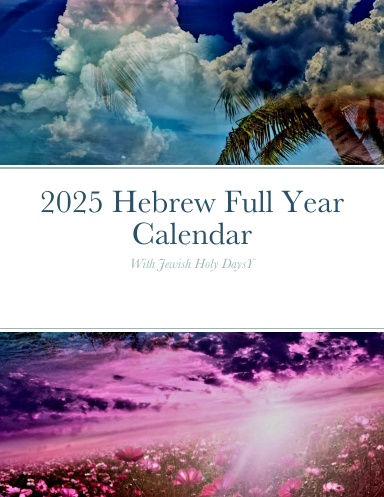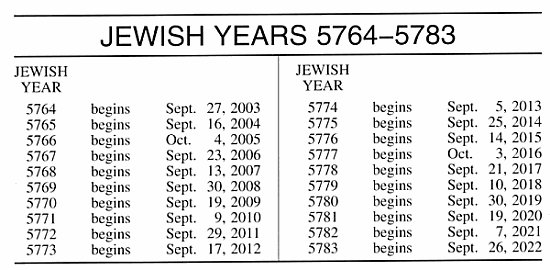Navigating the Jewish Calendar: January 2025
Navigating the Jewish Calendar: January 2025
Introduction
With enthusiasm, let’s navigate through the intriguing topic related to Navigating the Jewish Calendar: January 2025. Let’s weave interesting information and offer fresh perspectives to the readers.
Table of Content
Navigating the Jewish Calendar: January 2025

The Jewish calendar, a lunisolar system, presents a unique and intricate approach to timekeeping. Unlike the Gregorian calendar, which follows the solar year, the Jewish calendar aligns with both the lunar cycle and the solar year, resulting in a calendar that is both cyclical and dynamic. Understanding the Jewish calendar, particularly its nuances in a specific year like January 2025, requires delving into its fundamental principles and how they translate into the observance of religious practices and festivals.
The Foundation of the Jewish Calendar
The Jewish calendar is based on a 12-month cycle, with each month beginning at the sighting of the new moon. However, the lunar cycle is shorter than the solar year, meaning that the lunar calendar would drift out of sync with the seasons without adjustments. To rectify this, the Jewish calendar incorporates seven leap years within a 19-year cycle, adding an extra month (Adar II) to the year.
Key Elements of the Jewish Calendar
-
Months: The Jewish calendar consists of 12 months, each with its unique significance and observances. These months are:
- Tishrei: The first month of the Jewish year, known for Rosh Hashanah (New Year) and Yom Kippur (Day of Atonement).
- Cheshvan: The second month, often having 29 or 30 days depending on the year.
- Kislev: The third month, notable for Hanukkah, the Festival of Lights.
- Tevet: The fourth month, marked by the Fast of Tevet, commemorating the siege of Jerusalem.
- Shevat: The fifth month, known for Tu Bishvat, the New Year for Trees.
- Adar: The sixth month, a prelude to Purim, the Festival of Lots.
- Adar II (Leap Year): This month only appears in leap years and is primarily associated with Purim.
- Nisan: The seventh month, the most significant month for Jewish tradition, marking the Passover festival, commemorating the Exodus from Egypt.
- Iyar: The eighth month, often featuring the celebration of Lag Ba’Omer, a holiday commemorating the end of a plague.
- Sivan: The ninth month, known for Shavuot, the festival celebrating the giving of the Torah.
- Tammuz: The tenth month, marked by the Fast of Tammuz, commemorating the breaking of the siege of Jerusalem.
- Av: The eleventh month, known for the Fast of Av, commemorating the destruction of the First and Second Temples.
- Elul: The twelfth month, a time of introspection and preparation for the High Holy Days.
-
Days of the Week: The Jewish calendar utilizes a seven-day week, beginning with Shabbat (the Sabbath), which is observed from sunset on Friday to sunset on Saturday.
-
The Hebrew Date: The Jewish calendar uses a unique system of dating. The year is typically designated by the Hebrew year number, followed by the abbreviation "AM" (Anno Mundi, meaning "in the year of the world"). For example, 5785 AM refers to the year 2024/2025 in the Gregorian calendar.
January 2025 in the Jewish Calendar
January 2025 falls within the Jewish year 5785 AM, encompassing the last part of the month of Tevet and the beginning of the month of Shevat. This period holds significant religious and cultural importance.
-
Tevet: January 1st, 2025, corresponds to the 21st day of Tevet in 5785 AM. This period marks the Fast of Tevet, a day of fasting and reflection, commemorating the siege of Jerusalem by the Babylonians.
-
Shevat: January 20th, 2025, marks the beginning of the month of Shevat in 5785 AM. This month is known for Tu Bishvat, the New Year for Trees, a celebration of nature and the bounty of the land.
Observances and Significance
January 2025 presents a unique opportunity for Jewish communities to engage with various observances and traditions.
-
Fast of Tevet: This fast, observed on the 10th day of Tevet, serves as a reminder of the hardships faced by the Jewish people and the importance of repentance and introspection.
-
Tu Bishvat: This celebration, observed on the 15th day of Shevat, emphasizes the interconnectedness of humanity with nature and the importance of environmental stewardship.
-
Shabbat: The Sabbath, observed every week, is a time for rest, reflection, and spiritual renewal.
FAQs about the Jewish Calendar in January 2025
Q: How do I find the Jewish date for a specific date in January 2025?
A: You can use an online Jewish calendar converter to find the corresponding Jewish date for any Gregorian date. Many Jewish calendars and websites also provide monthly or yearly calendars with both Gregorian and Hebrew dates.
Q: What are the main religious observances in January 2025?
A: The main religious observances in January 2025 include the Fast of Tevet (10th of Tevet) and Tu Bishvat (15th of Shevat).
Q: How does the Jewish calendar differ from the Gregorian calendar?
A: The Jewish calendar is a lunisolar calendar, aligning with both the lunar and solar cycles. It utilizes a 12-month cycle based on the lunar phases, but incorporates leap years to synchronize with the solar year. The Gregorian calendar is a purely solar calendar, based solely on the Earth’s orbit around the Sun.
Q: What is the significance of the month of Shevat?
A: The month of Shevat is known for Tu Bishvat, the New Year for Trees. This celebration emphasizes the connection between humanity and nature, the importance of environmental stewardship, and the blessings of the land.
Tips for Navigating the Jewish Calendar in January 2025
- Consult a Jewish calendar: Use a reliable Jewish calendar to track the dates of religious observances and festivals.
- Learn about the observances: Familiarize yourself with the significance and practices associated with the observances in January, such as the Fast of Tevet and Tu Bishvat.
- Engage with your community: Participate in community events and gatherings related to the observances, fostering a sense of shared tradition and connection.
Conclusion
The Jewish calendar is a rich and complex system that reflects the historical, cultural, and religious values of the Jewish people. Understanding the calendar, particularly in a specific year like January 2025, provides insights into the diverse observances and traditions that shape Jewish life. From the somber reflection of the Fast of Tevet to the joyous celebration of Tu Bishvat, January 2025 offers a unique opportunity to engage with the tapestry of Jewish culture and spirituality.








Closure
Thus, we hope this article has provided valuable insights into Navigating the Jewish Calendar: January 2025. We hope you find this article informative and beneficial. See you in our next article!